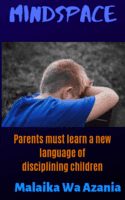I was physically abused by my mother until my late teens. When we were locked in heated confrontation, she would hit me if I responded to anything she said, arguing that I was disrespecting her. But when I would take the route of keeping quiet while she shouted at me, she would also hit me, arguing that I was treating her like a fool. I learned very quickly that whether I responded or not did not make any difference – I would be beaten up regardless. And so I learned to expect to be hit whenever I did wrong, and to not attempt to explain anything she misunderstood because that also invited more slaps across my face.
My mom stopped hitting me when I was in matric. The day is as vivid in my memory as though it was just yesterday. On that particular day, she had taken a wooden broom to hit me for something insignificant. I had grown tired of her violence. I could no longer take it. And so on that day, I grabbed the broom to move it away from her with the aim of confronting her. It hit the roof and broke the chandelier. Glass particles fell to the floor. In that moment I realised that if I fell down, I would be cut by the glass and be beaten as I bled. So I grabbed my mother by the hand while she was disoriented, looked her in the eye and said something I never thought I ever would: “I am tired of you treating me like a punching bag. You are not going to ever hit me again. It stops today. Today one of us is going to leave this house in a coffin and it is not going to be me. Hit me, Dipuo, and I’m going to kill you with my bare hands.” Stunned, she walked out of my room, shouting. That was the last day my mother ever laid a hand on me.
I love my mother with every fibre of my being. She was my best friend. Anyone who knows us knows how close we were, right until the day she passed away in 2017 after losing her battle with gastrointestinal cancer. We were very close. But that closeness didn’t happen out of nowhere. It took years for us to build our relationship. And it wasn’t easy. It wasn’t easy for me to reconcile how the woman who could be such an amazing mother could also be so violent. But I realised as I grew older that my mother was disciplining me the only way she knew how: through violence. It was what she had been taught growing up. Her own mother used that as a way of instilling discipline, and so to her, it was a normal way of dealing with conflict with her own child. But it was wrong. It was damaging. It was painful. And no child should ever have to be spoken to through a belt, a shoe or a wooden broom.
The reason why so many people in our country are angry with the Constitutional Court judgement that prohibits the spanking of children in the home is because they are tortured by what it means. Deep down, people don’t want to admit that hitting kids is abuse because it forces them to confront the fact that the parents they love and respect so much were in fact abusive. Many people are battling to reconcile that their parents hurt them, deliberately, because that completely disrupts the image they have of what love looks like. They are struggling to define parental love outside abuse, because it is what they know.
You can justify how “a little spanking” is harmless, how it is about “discipline”. But what you are in fact saying is that there are instances in which violence is justified, and that discipline can take the form of abuse. You are in no way different to a man who hits his wife to “discipline” her, because like you he believes that it is just. The man who grows to beat up his wife whom he feels disrespects him is the child who was beaten up by parents claiming they are disciplining him. The woman who stays in an abusive relationship with a man who, after beating her to within an inch of her life tells her how much he loves her is the little girl who was hit by her parents and told that this was being done in the name of love.
As South Africans, we cannot bemoan the devastation of violence in our country but fail to link that with the ways we were raised and the ways we raise our children. There is a connection, and for as long as we normalise hitting children, vulnerable human-beings, we are going to continue being part of a society where women, vulnerable human-beings, are statistics of domestic violence, and where men are afflicted with toxic masculinity. We cannot raise children through violence and expect them to be non-violent adults. And we cannot continue to rationalise violence in our homes and in the same breath, condemn it on our streets. Violence must stop, because regardless of what you think, we didn’t turn out well because we were beaten up, we turned out well IN SPITE of it. And many of us in fact are adults battling to recover from those childhood traumas.
Being beaten up is painful and is an expensive to which no child should ever be condemned. We must learn a new language of disciplining children. Violence is not it.
Malaika Wa Azania is the bestselling author of “Memoirs of a Born Free: Reflections on the Rainbow Nation” and a Masters candidate in the Department of Geography at Rhodes University.
Tell us: what are other ways of disciplining children?



